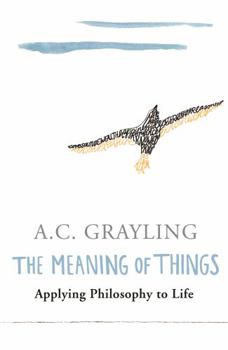The Meaning of Things, Applying Philosophy to Life
Select Format
Select Condition 
Book Overview
A refreshing distillation of insights into the human condition, by one of the best-known and most popular philosophers in the UK. Thinking about life, what it means and what it holds in store does not have to be a despondent experience, but rather can be enlightening and uplifting. A life truly worth living is one that is informed and considered so a degree of philosophical insight into the inevitabilities of the human condition is inherently important and such an approach will help us to deal with real personal dilemmas. This book is an accessible, lively and thought-provoking series of linked commentaries, based on A. C. Grayling's 'The Last Word' column in the GUARDIAN. Its aim is not to persuade readers to accept one particular philosophical point of view or theory, but to help us consider the wonderful range of insights which can be drawn from an immeasurably rich history of philosophical thought. Concepts covered include courage, love, betrayal, ambition, cruelty, wisdom, passion, beauty and death. This will be a wonderfully stimulating read and act as an invaluable guide as to what is truly important in living life, whether facing success, failure, justice, wrong, love, loss or any of the other profound experience life throws out.
Format:Paperback
Language:English
ISBN:0753813599
ISBN13:9780753813591
Release Date:July 2002
Publisher:Phoenix
Length:224 Pages
Weight:0.51 lbs.
Dimensions:0.7" x 5.0" x 7.6"
Customer Reviews
5 ratings
Excellent, Thought Provoking Humanistic Work
Published by Thriftbooks.com User , 18 years ago
Grayling's work consists of a series of thought-provoking essays with a decidely humanistic and secular theme. Grayling's essays are direct and focused. They're bold enough to provoke thoughts, and challenge the reader, and yet their ethic is human enough to resonate in most people. The reader will find themselves drawn to some essays, and rejecting others. In either case, the essay or essays in question will provide an simple and excellent springboard from which the reader can explore their own thoughts. Which is exactly what a good book of meditations should do. I recommend this book to anyone interested in contemplating secular ethics. Their humanistic premise makes Grayling's essays especially good for secular humanists, atheists, agnostics, and others with similar leanings.
A wonderful gift to the reader
Published by Thriftbooks.com User , 21 years ago
This book is a wonderful gift by AC Grayling to the reader. He conveys his deep understanding of philosophy and the world in an accessible way - this is something that cannot be said about too many philosophy books. The book is structured in short essays meaning it can be picked up, enjoyed and then put aside to allow time for rumination.... then it can be dipped into all over again. I must have read each essay several times and I still put it down feeling I have gained a little more from re-reading it. Highly recommended.
A Very Enjoyable Read
Published by Thriftbooks.com User , 21 years ago
I'm sure any reader of this book will take away some favourite sections. For me, the consecutively-placed entries on Betrayal, Loyalty & Blame were exemplary juxtapositions of those complementary topics.I would also recommend the entry on Racism.Given the brevity of the articles, sure they can't give you an in-depth discussion on the topic, but its just deep enough to get one thinking about the topics.I think this would be an excellent 'pocket-book' to dip into for anyone in their late teens trying to come to terms with the world.Having read this book, I moved directly to reading Graylings follow-up book, The Reason of Things.Only disappointment - no Bibliography, so when Grayling frequently quotes other Authors / Philosophers, I don't know where to go to for further reading.
Ethics without the burden of religion
Published by Thriftbooks.com User , 21 years ago
"Meditations for the Humanist: Ethics for a Secular Age" is a collection of 61 short essays, many only 2 pages long, that are meant to prompt reflection on a range of ethical questions and other issues of the human condition. As the title suggests, the book attempts (quite successfully) to address its topics from a perspective orthogonal to that of Christianity and other religious systems. The longest essays are, however, "Christianity" and "Faith," and Grayling does discuss religious viewpoints when relevant. Grayling writes with wit and his arguments are both persuasive and well reasoned (other than his essay, "Speciesism," which uses the underlying false argument that 0.98 is so close to 1 that (0.98)^n = 1 for any n.) But the best reason to read "Meditations for the Humanist" is that it is uplifting in its ethical and moral message - and by being so proves many of its points.
A jewel of practical philosophy
Published by Thriftbooks.com User , 22 years ago
This excellent collection of short, pithy, elegant essays on life's great questions is a best-seller in England, where it was first published, and it attracted rave reviews which your readers should know about (all the following appear on the British paperback edition): "Grayling writes with clarity, elegance, and the occasional aphoristic twist, conscious of standing in that long essayistic tradition that runs from Montaigne and Bacon to Emerson and Thoreau" (Sunday Telegraph); "This is a book to be dipped into and savoured over time; deeply humane and subtle in its thought as well as being imbued with a rare spirit of enlightenment" (Financial Times); "Astute and informative" (Independent on Sunday); "The essays are neatly turned, well researched, and dense with quotations from an impressive variety of sources; I admire the sheer courage of the undertaking - there is much to like" (Sunday Times);"Enlightened and enlightening" (Private Eye);"Grayling combines wide learning with wise argument to fulfil the role he assigns to these essays - to be prommpts to reflection" (Freethinker); and so on for many more. - I think this book makes a difference for the good, and everyone should read it.





